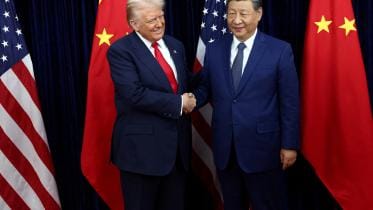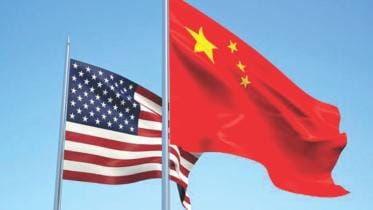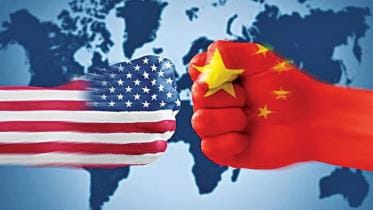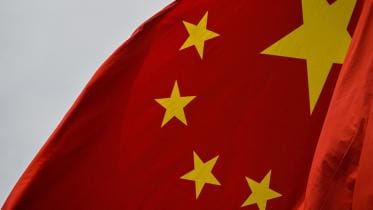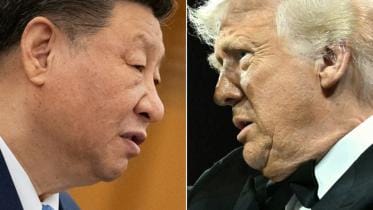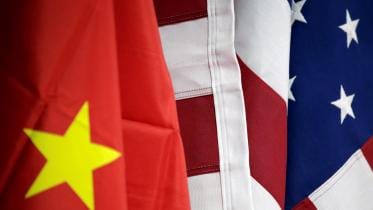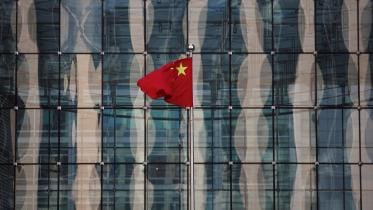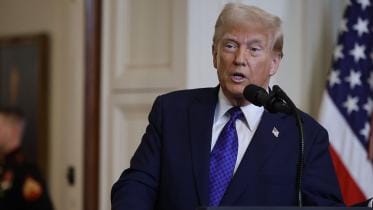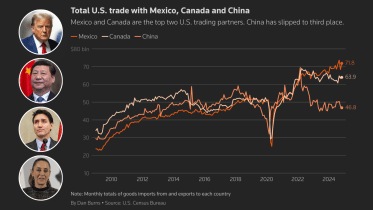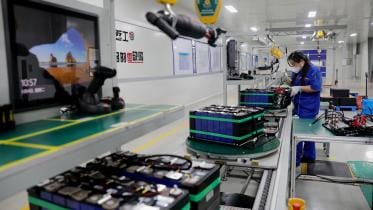US China trade war
Trump hails tariff, rare earth deal with Xi
The US leader said the talks yielded an extendable one-year deal on China's supply of crucial rare earths
30 October 2025, 06:21 AM
Trump says US, China are going to come away with deal
"We have China coming and its going to be very interesting," Trump told reporters
27 October 2025, 08:09 AM
US, China start trade talks in Kuala Lumpur
The world's two biggest economies are seeking to avoid further escalating a damaging tit-for-tat tariff war
25 October 2025, 06:17 AM
China's economic growth slows amid sputtering domestic demand
Gross domestic product in the July-September quarter expanded 4.8 percent year-on-year
20 October 2025, 06:37 AM
Trump threatens to end cooking oil purchases from China
His comments came shortly after he appeared to soothe rising temperatures between Washington and Beijing
15 October 2025, 07:58 AM
How the United States is eating Trump's tariffs
Trump famously predicted that foreign countries would pay the price of his protectionist policies
13 October 2025, 06:17 AM
Trump threatens China with export controls on Boeing parts
The planemaker is in talks to sell as many as 500 jets to China, Bloomberg reported in August
12 October 2025, 08:11 AM
Trade war de-escalation: US, China reach deal to slash tariffs
The United States and China have agreed to temporarily slash reciprocal tariffs in a deal that surpassed expectations as the world’s two biggest economies seek to end a damaging trade war that has stoked fears of recession and roiled financial markets.
12 May 2025, 18:23 PM
China warns countries against striking trade deals with US at its expense
Beijing "will take countermeasures in a resolute and reciprocal manner" if any country sought such deals, a ministry spokesperson said
21 April 2025, 02:51 AM
In trade war with the US, China holds a lot more cards than Trump may think − in fact, it might have a winning hand
On April 11, China dismissed Trump’s moves as a “joke” and raised its own tariff against the US to 125%
12 April 2025, 07:23 AM
China urges US to meet 'halfway' as markets rocket on Trump tariff pause
The heightened tariffs against China took effect at the same time Thursday as retaliatory levies of 84 percent slapped on by Beijing on US imports.
10 April 2025, 08:45 AM
China vows 'firm and forceful measures' in response to new US tariffs
"The US continues to abuse tariffs to pressure China"
9 April 2025, 07:35 AM
Asian buyers shun US farm goods, hit by ship crunch and trade war
China, which retaliated with 34 percent duties on US goods, is the largest importer of US agricultural products
9 April 2025, 07:25 AM
China hits back hard in global trade war with tariffs on US goods
China announces 34% additional tariffs; Stock markets around the world keep falling, banks hit hard
4 April 2025, 11:38 AM
China hits back with tariffs on US goods
Beijing slaps 15% levy on US LNG, coal; 10% on crude, farm equipment
4 February 2025, 05:29 AM
Trump’s trade war ushers in a new opportunity for Bangladesh
However, China will be the most affected under Trump since he said there would be an additional 10 percent duty for goods coming from the Asian giant.
3 February 2025, 08:17 AM
Trump launches trade war with tariffs on Mexico, Canada and China
President Donald Trump announced broad tariffs Saturday on major US trading partners Canada, Mexico and China, claiming a "major threat" from illegal immigration and drugs -- a move that sparked promises of retaliation.
2 February 2025, 02:30 AM
Trump's return threatens resurgence of trade wars
Even before taking office, Trump has raised the prospect of fresh levies on companies, countries and groups of states as he seeks to implement his agenda
14 January 2025, 09:17 AM
US-China officials to hold economic talks before Trump return
Economic and trade tensions between Washington and Beijing have continued to flare during Biden's time in office.
12 December 2024, 05:39 AM
US clean energy, defense to be impacted by China export curbs
Beijing announced this week it would ban exports of gallium, germanium and antimony to the United States, targeting materials used for everything from semiconductors to solar cells
8 December 2024, 05:00 AM



